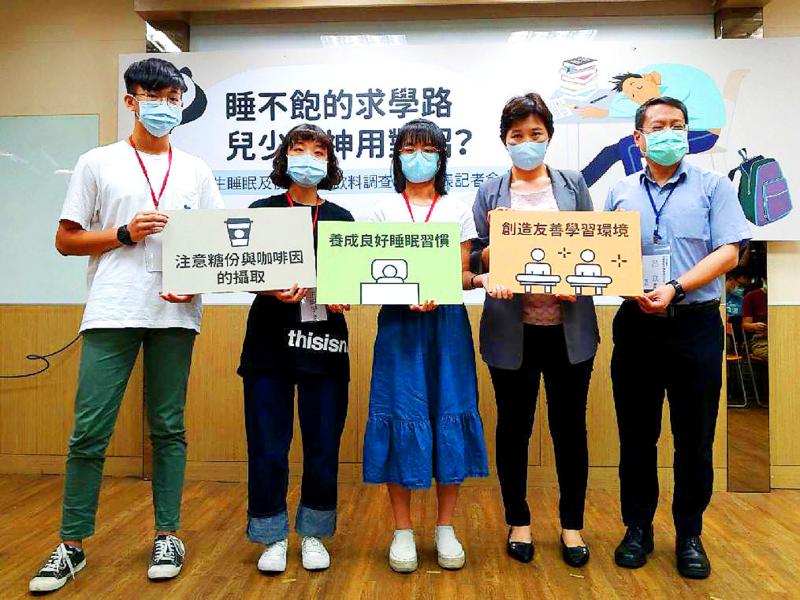Nearly 80 percent of students in Taiwan get less than eight hours of sleep per night, a survey released yesterday by the Child Welfare League Foundation showed.
The survey, which looked at sleeping habits and the use of stimulant drinks among junior, senior and vocational high-school students, found that respondents got an average of 6.9 hours of sleep each night.
Overall, students go to bed at 11:15pm and wake up at 6:12am, the foundation said.

Photo: CNA
Junior-high school students reported an average of 7.3 hours of sleep per night, while students in senior or vocational high schools reported 6.5 hours, the survey found.
Among the latter, 88.9 percent said they slept less than eight hours a night, and 23.7 percent said they slept less than six hours, the survey found.
Asked why they stayed up late the last time, 33.6 percent of respondents said it was to read, do their homework or prepare for a test, 22.6 percent said “screen time” and 21 percent said they either had trouble falling asleep or were in a bad mood.
One-quarter of respondents who reported averaging seven or less hours of sleep said they “often” or “always” doze off in class, while the same was true for 12.7 percent of those who reported more than seven hours of sleep, the foundation said.
Nearly 52 percent of respondents who slept seven hours or less said they felt exhausted after a day of classes, including after-school instruction, while 32.6 percent of those who slept more than seven hours said that was the case, the survey found.
In addition, 68.6 percent of respondents reported drinking an energy drink or coffee in the past month, while 35.1 percent of respondents who drank more than one cup of coffee per week had trouble with sleep, the foundation said.
Children aged 13 to 18 should be getting eight to 10 hours of sleep, foundation executive secretary Huang Yun-shan (黃韻璇) said.
Lack of sleep can lead to tiredness during the day, reduce a person’s concentration and affect their mood, said Frank Lu (呂立), director of the pediatric pulmonary and critical care medicine department at National Taiwan University Children’s Hospital.
People who have trouble sleeping should try to keep a regular sleeping schedule, exercise during the day and avoid stimulating activities before bedtime, such as looking at their phones, he said.
The survey was conducted via paper questionnaires from Sept. 16 to Oct. 31 last year, and 1,536 valid samples were collected, the foundation said, adding that the survey had a margin of error of 2.5 percentage points.

The manufacture of the remaining 28 M1A2T Abrams tanks Taiwan purchased from the US has recently been completed, and they are expected to be delivered within the next one to two months, a source said yesterday. The Ministry of National Defense is arranging cargo ships to transport the tanks to Taiwan as soon as possible, said the source, who is familiar with the matter. The estimated arrival time ranges from late this month to early next month, the source said. The 28 Abrams tanks make up the third and final batch of a total of 108 tanks, valued at about NT$40.5 billion

A group from the Taiwanese Designers in Australia association yesterday represented Taiwan at the Midsumma Pride March in Melbourne. The march, held in the St. Kilda suburb, is the city’s largest LGBTQIA+ parade and the flagship event of the annual Midsumma Festival. It attracted more than 45,000 spectators who supported the 400 groups and 10,000 marchers that participated this year, the association said. Taiwanese Designers said they organized a team to march for Taiwan this year, joining politicians, government agencies, professionals and community organizations in showing support for LGBTQIA+ people and diverse communities. As the first country in Asia to legalize same-sex

Travel agencies in Taiwan are working to secure alternative flights for travelers bound for New Zealand for the Lunar New Year holiday, as Air New Zealand workers are set to strike next week. The airline said that it has confirmed that the planned industrial action by its international wide-body cabin crew would go ahead on Thursday and Friday next week. While the Auckland-based carrier pledged to take reasonable measures to mitigate the impact of the workers’ strike, an Air New Zealand flight arriving at Taipei from Auckland on Thursday and another flight departing from Taipei for Auckland on Saturday would have to

MOTIVES QUESTIONED The PLA considers Xi’s policies toward Taiwan to be driven by personal considerations rather than military assessment, the Epoch Times reports Chinese President Xi Jinping’s (習近平) latest purge of the Chinese People’s Liberation Army (PLA) leadership might have been prompted by the military’s opposition to plans of invading Taiwan, the Epoch Times said. The Chinese military opposes waging war against Taiwan by a large consensus, putting it at odds with Xi’s vision, the Falun Gong-affiliated daily said in a report on Thursday, citing anonymous sources with insight into the PLA’s inner workings. The opposition is not the opinion of a few generals, but a widely shared view among the PLA cadre, the Epoch Times cited them as saying. “Chinese forces know full well that